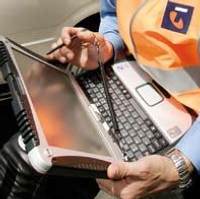

Current Cover






|
|
|
|
|
|
Case Studies: TelecommunicationsDeployment of 3,500 Panasonic Toughbooks Lowers Telstra's Total Cost of Ownership..
The roll-out represents the largest ever installation of ruggedised notebooks in the Australian telecommunications industry.
Prior to selecting the Panasonic Toughbooks, Telstra conducted a detailed needs analysis to determine the organisation's precise requirements. During this process, hardware solutions from several major vendors were assessed against key selection criteria. One of these criteria was total cost of ownership (TCO) - an area in which the Toughbook was judged to have particular strengths over competitors. A low TCO delivered through the ruggedised Toughbook's superior all-environment operational capabilities led Telstra to select it as the most suitable solution for their field engineers.
Commenting on the decision by Telstra to select the Toughbook CF-18, Steve Hall, Group Manager, Toughbook, Panasonic Australia said: "This solution strongly supports Telstra's commitment to customer service. Interruptions to engineers' work schedules caused by computer-related issues in the field can have an enormous impact, and we believe that using a ruggedised solution instead of standard notebooks will reduce this by as much as 90 per cent.
"In calculating the TCO of Panasonic's Toughbook, Telstra took into account all costs incurred when a unit fails in the field. These included human resources needed, the replacement unit cost, the turnaround time for re-configuration and return to the field and most importantly, the potential effect on customer service levels due to the engineer’s downtime. After conducting analysis along these lines, the Toughbook CF-18 was a clear winner.
"Panasonic's Toughbooks are designed specifically to endure harsh outdoor working environments, in conditions that are beyond the capabilities of normal laptops. That is why they are used by the military, telecommunications companies and utilities worldwide," Steve Hall said. According to Alan Olden, Head of Metro Service, Telstra, "Panasonic's Toughbook is a hardware solution that will enhance the capabilities of Telstra's field engineers for a significantly longer period of time than a standard laptop or pocket PC.
“Telstra's analysis of technology solutions has shown that by investing in ruggedised hardware, we can expect a lower failure rate in the field, which results in a lower TCO in the long term through increased productivity and uptime.
"Based on initial feedback from our field engineers, we expect that the Panasonic Toughbook CF-18 will deliver significant benefits to users and to the organisation. All units offer high tolerance for harsh field conditions, and have inbuilt CDMA1x data capability, giving users full wireless capability to access the internet, email and Telstra applications essential for field operations.
"Field trials of the Toughbooks have been extremely successful. Engineers were very impressed with the unit's combination of robust features and compact size, and found the touch screen very convenient to use.
Another reported benefit of the unit in the field is that applications that used to take one and a half minutes to load onto a pocket PC can be downloaded to a Toughbook in around two seconds. In addition, field engineers have reported major improvements over the pocket PCs in terms of battery life, with the Toughbook's battery lasting two to three times longer than a standard laptop battery," Alan Olden added.
|
 The Panasonic Toughbooks replace the incumbent pocket PC units used by Telstra field engineers, providing them with increased mobility, productivity and uptime in all environments and weather conditions. Each Toughbook has ruggedised features designed to prevent damage occurring in harsh outdoor working environments and has a swivel LCD design that converts from a notebook to a rugged touchscreen Tablet PC. The Toughbooks are customised with an integrated CDMA1x modem and Telstra software, enabling engineers to work effectively, even in the most remote locations in Australia. Panasonic Toughbook integration partner Marknet Technologies individually staged and configured all units to Telstra requirements.
The Panasonic Toughbooks replace the incumbent pocket PC units used by Telstra field engineers, providing them with increased mobility, productivity and uptime in all environments and weather conditions. Each Toughbook has ruggedised features designed to prevent damage occurring in harsh outdoor working environments and has a swivel LCD design that converts from a notebook to a rugged touchscreen Tablet PC. The Toughbooks are customised with an integrated CDMA1x modem and Telstra software, enabling engineers to work effectively, even in the most remote locations in Australia. Panasonic Toughbook integration partner Marknet Technologies individually staged and configured all units to Telstra requirements.